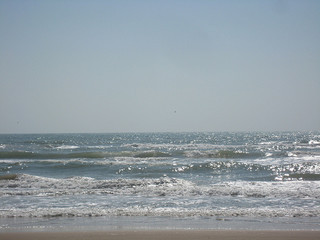Firmanent / Tearing
"And God said, let there be a firmament in the midst of the waters,
and let it divide the waters from the waters." -- Genesis 1:6
Our sages teach: read not "firmanent"
but "rupture." Swap two sounds
in the original Hebrew
and the vastness of the sky's expanse
becomes the primal tearing
at creation's birth, God wounded.
Our stories teach: all the waters
wanted to be in the realms above
until God, angered, crooked His finger
and the fabric of the cosmos tore.
This dissent is why Torah doesn't say
God saw that it was good.
Only the second day of existence
and God wore that ripped scrap of gabardine
which speaks mourning: "as our lives
are torn, we perform this act of keria..."
God divided the waters of birth
from all our sea-salt tears to come.
Every birth is also a death: the end
of the life that used to be.
Every separation is also a rupture.
Read not "good" but "God:" God saw
that creation was constantly changing
just like its creator, dividing and torn.
This poem arises out of this week's material in Rabbi Abraham Joshua Heschel's Heavenly Torah. Heschel writes:
Regarding the waters: On the second day of creation, the Holy and Blessed One said: "let there be an expanse (raki'a) in the midst of the water, that it may separate water from water. God made the expanse and it separated the water that was below the expanse from the water which was above the expanse" (Genesis 1:6-7). "God said to the waters: divide yourselves into two halves; one haf shall go up, and the other half shall go down; but the waters presumptuously all went upward. Said to them the Holy and Blessed One: I told you that only half should go upward, and all of you went upward?! Said the waters: We shall not descend! Thus did they brazenly confront their Creator... What did the Holy and Blessed One do? God extended His little finger, and they tore into two parts, and God took half of them down against their will. Thus it is written, 'God said, let there be an expanse (raki'a) -- do not read 'expanse, but 'tear' (keri'a)." (Midrash Konen, Otzar Midrashim, p. 254)
In a footnote, translator and editor Rabbi Gordon Tucker adds:
The Hebrew keri'a is an anagram of raki'a. This is quite an impressive midrash, coming from the early medieval collection known as Midrash Konen. This passage makes obvous analogies between God's creation and human birth. Both involve waters breaking, both involve pain and a tear. The tear in the waters was necessary to create space in which life could develop, and the tear of birth is necesary for the baby to begin an independent life. Keri'a is the rite for the dead, when Jewish law requires the tearing of clothing. The message then is twofold: the tear of death is just the continuation of the tear of birth. Both are necessary for life to continue, and we are powerless to change that. The other message is that God is as much bound by these truths as we are. God also could not create without a day of division and tearing, and thus we and God are both in need of comfort and strength in the wake of the cruelties of nature.
It's a tremendous chapter. My poem is offered in humble homage.
Photo taken at South Padre Island.
Rachel Barenblat's Blog
- Rachel Barenblat's profile
- 6 followers




